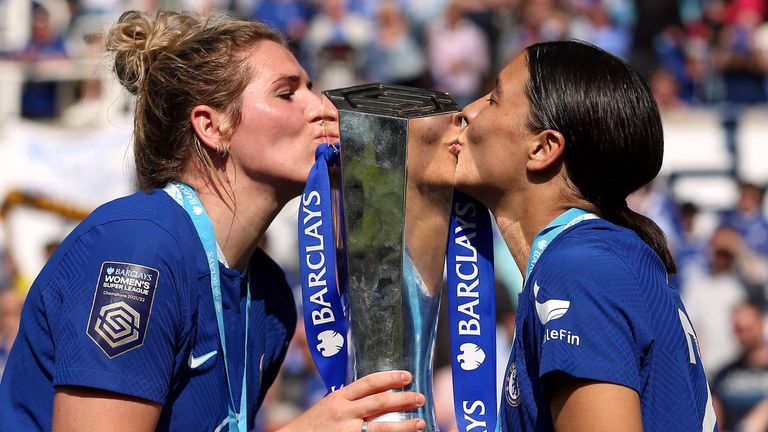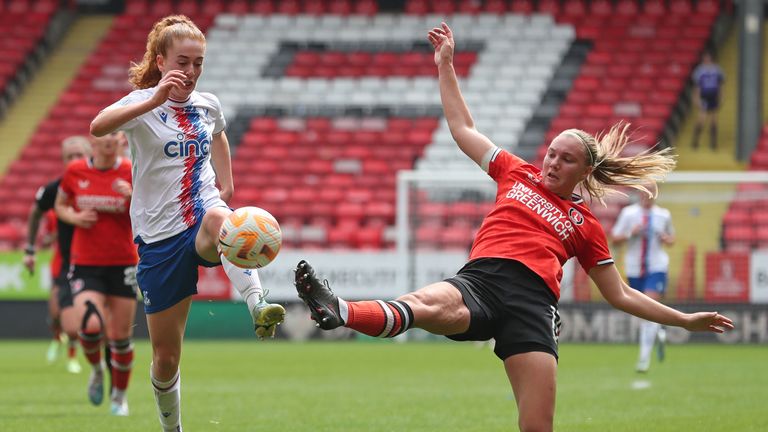[ad_1]
Women’s football could be a billion-pound industry within 10 years if it gets the right investment now, according to the chair of a new independent review.
Former England international Karen Carney’s review panel has called for wide-ranging reform at the elite and grassroots level of domestic football to fully capitalise on the Lionesses’ Euros success last summer.
Among the key calls in the review to grow the women’s game published a week before the start of the Women’s World Cup are:
- The creation of a fully professional environment in the top two tiers, with a minimum ‘salary floor’ in the Women’s Super League from 2025-26, gold standard physical and mental healthcare provision, a world-leading parental leave package and full union representation.
- A redirecting of some funding from the men’s FA Cup prize pot to support the women’s game.
- Identification of a new strategic partner to invest in improving the talent pathway and academy structure.
- A dedicated broadcast slot – possibly Saturday 3pm, if women’s football can be exempted from the blackout period with the support of the football authorities.
Carney recognises many of the measures outlined in the review will require significant investment but said: “Women’s football is a start-up business.
“If you’re starting something you have to have an influx of money. In 10 years’ time I really do believe this sport could be a billion-pound industry.
“But these standards and these requirements for investment are the foundation that will lead us to that point.
“I really do think we can make that (investment) back.”
Minimum standards must be set across the game
Carney said the review’s aim was to introduce minimum standards across all areas of the game, and insisted that even though there were significant cost implications for clubs and the FA in particular, this was not something anyone in the game could afford to ignore.
“I have to have every confidence that these recommendations will be implemented and with urgency,” she said. “This should never, ever sit on the shelf, it’s got to stand for something.
“Do I want players going on the NHS (to get treatment for injuries)? No. Do I want players to be using bin bags for curtains? No I don’t.
“I understand there is going to be a lot of pushback, people saying that it’s a big investment piece, but that’s what is needed now.
“In 2011 when the WSL was launched, I bet the same conversations happened then (with people saying) ‘it’s a lot of money we’ve got to find’.
“Even I thought that at the time. But that has led us to this point, now we’re further along we need to get to the next point.”
An independent women’s football review was recommended in the 2021 fan-led review of football governance, and was commissioned by the Government in September last year.
In all the 128-page report, formally titled ‘Raising The Bar: Reframing the opportunity in women’s football’, has produced 10 recommendations, primarily focused on ensuring minimum standards are met on a range of areas.
Among the recommendations it calls for a new unit, funded by the Football Association, to research issues affecting female footballers such as the greater prevalence of anterior cruciate ligament (ACL) injuries among women compared to men.
Professionalise the Championship alongside the WSL
It calls for a fully professionalised environment in the top two tiers of the women’s game, including the introduction of a minimum salary in the Women’s Super League by 2025-26 and an increase in contact time between clubs and players in the Championship from eight hours a week to 20 by 2027-28.
It also says there should be full union representation for all players in the top two divisions.
However, it rejected the idea of a US-style closed format for the top two tiers, something it said was being considered by an FA working group handling the transition of the WSL and Championship to ownership by a new company.
The review calls for a redirection of some of the men’s FA Cup prize pot of £20m as a solidarity contribution, in particular to help Women’s Championship clubs meet some of the minimum standards the review sets out.
It highlights a lack of investment in the talent pathways, with Carney pointing out the need to “kickstart” progress with a strategic partner.
Asked if that could include an organisation such as the Saudi Public Investment Fund, she said that would be a decision for the new company which takes over ownership of the WSL and the Championship from 2024-25.
Carney accepted there were “pros and cons” of trying to seek an exemption for women’s football from the Saturday afternoon blackout period but added: “We need stakeholders to have an adult conversation and say ‘how can we help women’s football?’
“At the moment it’s really saturated, the time slots are not really working. I have to say the Premier League have been brilliant, and the EFL, everyone wants to help.”
The review also called on the FA to address a lack of diversity in the game, first by auditing the existing workforce and then by creating a workforce strategy.
‘Women’s football has huge potential’ | What have they said?
Culture Secretary Lucy Frazer said:
“I want to pay tribute to Carney and her panel of experts for all the hard work and dedication they have put into producing such an important review. After the joy of last summer when the Lionesses lifted the Women’s EURO 2022 trophy, and as we approach the Women’s World Cup in just a few days time, we are at a milestone for women’s sport.
“Women’s football in particular has huge potential to improve the lives of women and girls and offer a special and accessible sporting environment for fans. Everyone involved in the game must consider the recommendations made in this report and help take the game to the next level.”
PFA CEO Maheta Molango said:
“Karen Carney’s report is a brave, ambitious and detailed plan for the future of women’s game which, crucially, has players at its heart. Karen and her team haven’t backed away from difficult questions. Throughout this process they have made sure that they heard directly from players and former players. Their insights are critical to understanding the realities of a career in the women’s game.
“We are proud that WSL players are members of the PFA and have access to the services and independent support we provide. The report recommends that union representation for players in the WSL and also the Women’s Championship should now be fully and comprehensively funded by the Football Association, as it would be in other countries where proper Collective Bargaining Agreements are in place between players and governing bodies. That’s a major step forward which, alongside the recommendation that the Women’s Championship should become fully professional, will allow us to enhance and expand the services we provide to players.”
PFA Women’s Football EDI Executive Fern Whelan said:
“It’s positive that the Review has highlighted the lack of diversity across the women’s game as something that needs to be urgently addressed. It’s an issue I’ve been doing a lot of work on in my role with the PFA. We can all see that there is a lack of representation across the women’s game. That isn’t by design, or something the game needs to be defensive about. It’s something where we’ve acknowledged there is an issue and begun to take action, but we need to keep pushing.
“Are we doing enough to encourage girls and young women from diverse backgrounds into the game? Are we making the professional pathway accessible enough? It’s often about practicalities as well as culture. We have to make as many girls and young women as possible feel that women’s football is ‘for them’.”
What happens next?
Sky Sports News reporter Geraint Hughes:
Former Lioness Carney was asked by the Government last September to chair a review that would make recommendations about how the women’s domestic game could and should improve. The Government will now consider the review’s 10 key recommendations and respond in the autumn.
The success of the Lionesses and the growth of the WSL offers a huge opportunity to put the players at the heart and centre of the game, make women’s football inclusive and welcoming with a diverse cohort of players. However, much needs to improve in order for 10 key recommendations set out in Carney’s review into domestic football to be achieved.
Carney believes all 10 recommendations are vital for a sustainable future although Carney told Sky Sports News fully professionalising both Women’s elite leagues, the Championship alongside the WSL was perhaps the most significant.
“Minimum standards” within the women’s game have to be set and met by all stakeholders. Carney said this meant levelling up facilities, citing examples from where players had to use bin bags as privacy curtains while changing to offering standardised maternity conditions. The review recommends that the FA should fund comprehensive and formalised union representation for both Women’s Super League and Women’s Championship players. Union representation through the PFA exists in the men’s game and is viewed as an important way for players to voice concerns.
After speaking with players past and present, Carney also revealed many felt like “second class citizens”. They were an afterthought behind the men’s game in many cases. She also posed a question over the disparity between funding for boys Academies compared with girls – £88m for boys, £3.25m for girls. That gap had to be narrowed. The Review recognised ‘gender bias’ citing areas around pay and prize money that need to be addressed. The average salary in the WSL ranges between £25,000-£28,000 while in the Championship the lowest salaries were just £4000 meaning those players had to have other jobs alongside football. There were huge disparities in medical care between the two leagues, some players had to get medical support via the NHS rather than from the club they played for.
The word “investment” appeared 92 times in the Report with Carney explaining that women’s domestic football must be viewed as a “start-up” business. Invest now and see the return later as you would in any other business and Women’s football should become a billion pound industry.
While men’s football will have an Independent Regulator, most probably within the next two years, the question over whether that Independent Regulator would also oversee the women’s game received a differing view from Carney’s Review. Regulation is required within the women’s game, but as it such a new entity with the FA handing over the running of the WSL and Championship to ‘NewCo’ self-regulation is the best course at the moment. Carney did not rule out a Regulator in the future, but it was her belief that NewCo should work within a regulatory framework, but not with oversight from an Independent body.
The review also addressed issues about how to best promote and market the game. The Review believes that the current broadcast slots for the WSL are not helping the growth of the game or the fans. Many of the WSL matches kick-off in slots around 11.30am and 6.45pm, Carney wants clearer and better kick-off times so that fans know when they can watch or attend games. She didn’t believe that Article 48 which protects & prohibits the broadcast of football matches in the UK at 3pm on a Saturday afternoon should be revoked as it could cause a number of problems, but she is urging stakeholders to work together so perhaps informal agreements around the broadcasting of games could be discussed including the 3pm Saturday slot.
[ad_2]
Source link



